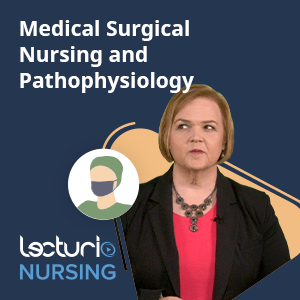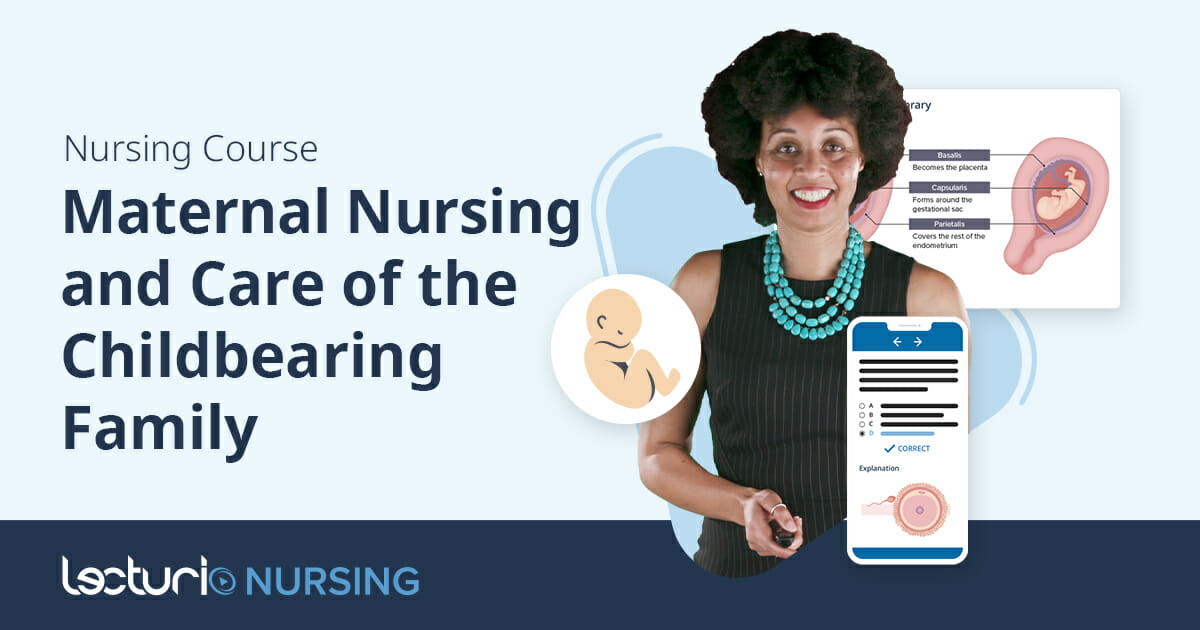As someone who has made it past this course in nursing school myself, let’s talk about some study tips that will help get you through efficiently and with less stress. First, I want to talk about why Med-Surg feels like such a hard course.
Take the Course: Med-Surg and Pathophysiology
Let Prof. Rhonda Lawes guide you through the nitty-gritty of med-surg in her complete online course!
Why Is Med-Surg A Hard Class?
The Medical-Surgical nursing school class, often just referred to as Med-Surg, is a difficult class for many nursing students. But why?
Well, after prerequisite classes, it is often the first core curriculum class in any nursing program. So, not only have you not figured out how to manage the tough schedule and unique testing design of nursing school as a whole, but now you are dropped into this class that is so packed with information you must know that it is often divided into two classes.
Med-Surg covers every body system and for each system, you must know the diseases associated with them, the medications and treatments associated with them, how to assess for them, and how to educate the patient about them. Not to mention things about safety, regulations, ethics, and therapeutic communication.
The Med-Surg class sets the foundation for the rest of your nursing program and your knowledge as a nurse. Everything beyond this class gets more specific and builds upon the information you learn, so it is vital to really commit it to memory for the long haul.
6 Study Tips For Med-Surg in Nursing School
With that being said, before I began my Med-Surg class, I had no idea where to start. It seemed daunting and overwhelming. My first piece of advice? Take a deep breath. Okay, now let’s talk about a few study tips for navigating this difficult class.
Practice questions with rationales
One of the best strategies I have used while studying in nursing school that is especially helpful for Med-Surg is to practice questions with rationales.
Whether you use HESI or ATI (or another standardized testing organization, but those are the two most common) in your nursing program, there is usually accompanying software with practically endless practice questions with rationales of why the answer you chose is right or wrong.
I have found these to be great in figuring out patterns in what topics questions pull from most often. I’ll get to more on that later, but in general, starting with the practice questions shows the baseline of how much you already know and highlights where in the content you need to focus your studying.
Note connections as you go
As you begin to get through a significant amount of practice questions, you’ll start to notice some connections. Things like groups of medications that share similar action, which medications they ask about repeatedly, phrases that are never the right answer, and certain rationales that point you to the right answer even on multiple questions.
For instance, in Med-Surg you’ll see a lot of questions that the right answer is whichever option comes first in the nursing process (Assessment, Diagnosis, Plan, Intervention, Evaluation). So if there are four answer choices and one tells you to assess something, that is likely the answer because it comes first in the nursing process.
Understand the diagnoses
The other thing that helps when there is a large volume of content to know like in a Med-Surg nursing class is to understand the diagnoses and what process they follow in the body rather than just trying to commit every little detail to memory.
This will do two things–
- Allow you to make better-educated guesses on questions you are unsure of.
- Help you remember the associated symptoms, assessment findings, and medications for each disease or diagnosis without directly memorizing them.
So first pick out all of the illnesses and diseases you need to know and study what they do to the body.
For example, if you study any sort of diagnosis related to the kidneys and you know what happens to the kidney with this disease, you can make inferences about what you will find on your assessment, the symptoms the patient will be experiencing, and which medications will be used to treat it.
Kidney diseases always cause problems with electrolyte and fluid balance, so in your assessment, you’ll see abnormal lab values, fluid retention, possible cardiac arrhythmias, and abnormal voiding patterns. Since those are the findings, you’ll also be able to conclude that the patient will be undergoing treatments and on medications to fix those problems like dialysis, electrolyte replacement, diuretics, etc.
From simply knowing what the diagnosis is doing in the body, you have the answer to a wide variety of questions without specifically having to be able to recite every small detail.
Match the medications
For the medications you see come up often in the practice questions, spend time to match them to their medication class and the most common disease they treat. Then, learn the most common side effects and patient teachings for the medication classes rather than the individual medications.
This way, as long as you can identify the type of medication, you’ll be able to answer questions about it even if you didn’t study that specific medication directly.
Look for buzzwords
Remember how we told you that you are going to find patterns while doing practice questions and reviewing rationales? Well, this is also where you are going to look for buzzwords. As you work through questions and read the rationales, you’ll start to notice certain buzzwords in the questions, answer choices, and the rationales.
For instance, in a question, a common buzzword is “best” or “first” as in “What is the best action of the nurse?” or “What should be the nurse’s first action?”. These buzzwords can help you identify the type of question and eliminate answers based on what you have noticed these buzzwords are associated with. The “best” or “first” buzzword questions are always about prioritization for example.
Find alternative resources
My last tip is to find alternative resources to get various perspectives, a more in-depth look at something, or to have a difficult topic explained differently.
I like finding Youtube videos that dive into the subject or highlights the most important topics, using the courses on Lecturio to watch videos in conjunction with their expert cheat sheets, or going on Quizlet to see how other students have analyzed topics.
Nursing School Med-Surg Study Tips Bottom Line
Ultimately, each of these study tips boils down to one thing to remember– when it comes to your Med-Surg class, focus on making connections, seeing the patterns, and understanding the pathology versus simply committing this huge volume of information to memory. Approaching the class in this way will allow you to use your time effectively and understand the content on a deep level to build on for future classes. You’ve got this!




